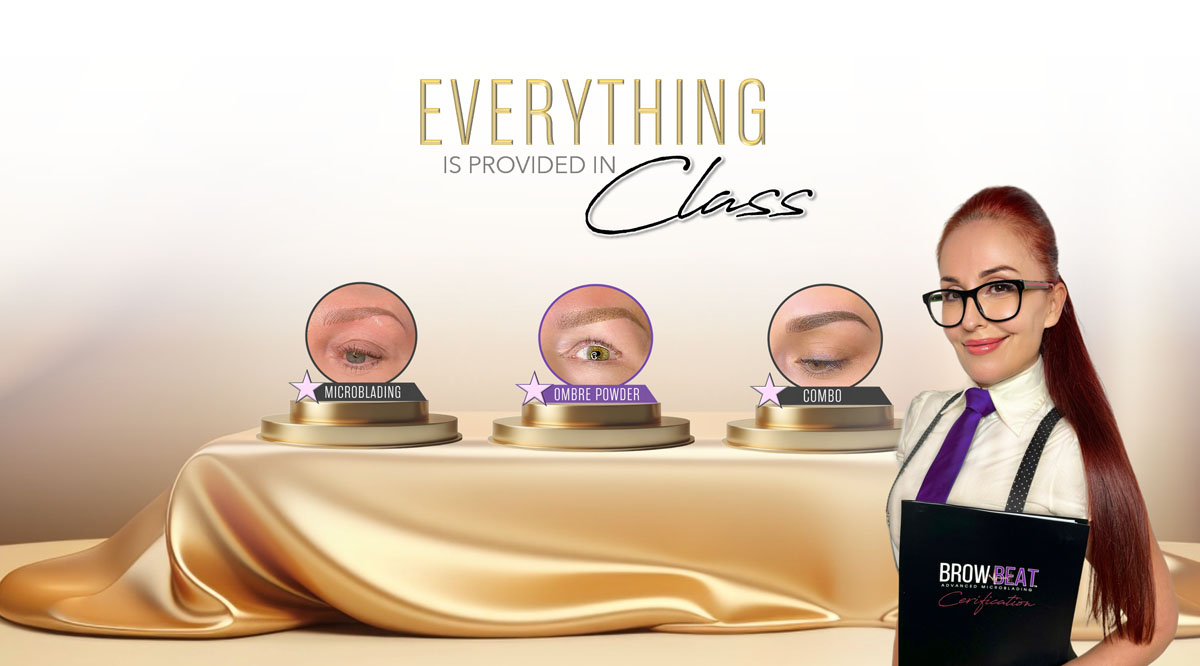Becoming a professional brow artist is an exciting goal, but before launching your career, you need to understand the certification requirements that govern microblading and powder brows in Texas. The beauty industry is full of opportunities, but it is also heavily regulated. Knowing what’s expected of you ensures that you can operate legally, ethically, and with full confidence. This blog will guide you through everything you need to know about microblading and powder brow certification requirements in Texas, while showing how BrowBeat Studio Dallas Microblading Certification and Training Academy prepares students to meet them from day one.
Why Certification Requirements Matter in Texas
Certification is the bridge between passion and professionalism. Without it, you might know how to hold a microblading tool or PMU machine, but you would lack the credibility and authority to offer services in a regulated environment. Texas, like many states, takes tattooing and semi-permanent cosmetics seriously, setting rules that protect clients and artists alike.
Here’s why requirements matter so much:
- Safety: Semi-permanent brows involve puncturing the skin. Without meeting state requirements, you risk cross-contamination or unsafe practices.
- Client trust: Modern clients are educated. They ask about certification, training, and licensing before booking. Meeting requirements gives them peace of mind.
- Career opportunities: Many salons, spas, and studios won’t hire uncertified artists. Requirements serve as a gatekeeper to better jobs.
- Legal compliance: Practicing without the proper certification and license can lead to fines or being shut down.
In short, certification requirements are not just about ticking boxes—they define your ability to succeed long-term in the semi-permanent makeup field.
The Growth of Semi-Permanent Brows and Why Texas Regulates Them
The rise of microblading and powder brows has transformed the beauty industry. Over the last decade, demand for brow artistry has skyrocketed. With more demand comes more responsibility—Texas wants to ensure that only properly trained, certified, and licensed professionals offer these treatments. This protects both the public and the reputation of the industry.
But regulation also means that students need guidance. Many new academies skip teaching the finer points of certification and licensing, leaving graduates confused about what comes next. That’s where the difference between a quick-turn training program and a professional academy really shows.
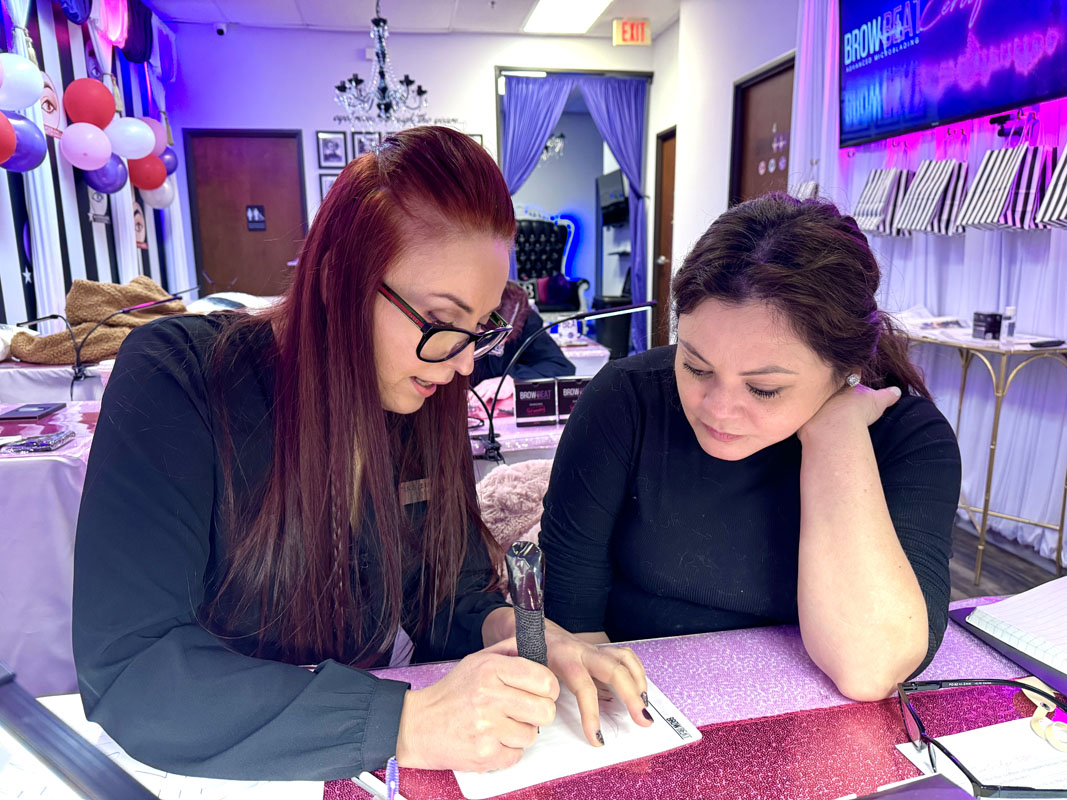
Breaking Down Texas Certification Requirements
In Texas, the pathway to practicing brows professionally involves several steps. These steps ensure that artists understand safety, technique, and compliance. Let’s break them down:
1. Completing a Professional Certification Course
The first requirement is to complete a professional certification program from a recognized academy. This training gives you the foundation in microblading, powder brows, and combo techniques. At BrowBeat Studio Dallas Microblading Certification and Training Academy, students complete a three-day intensive course that covers everything from stroke mastery to PMU machine training. Only after completing this step can you move toward state licensing.
2. Receiving Training in Health and Safety
Another core requirement in Texas is training in health and safety. You must understand how to set up a sterile workstation, use gloves properly, dispose of sharps, and prevent cross-contamination. These skills are part of every BrowBeat course, but not every academy spends adequate time on them. Unfortunately, many trainers with only 1–2 years of experience skim over this crucial requirement, leaving students unprepared.
3. Applying for a Texas Tattoo License
Certification alone is not enough to work legally. Once you complete your training, you must submit an application for a tattoo license in Texas. This license allows you to legally offer semi-permanent makeup services. BrowBeat helps students by providing the paperwork and walking them through the process. Many students find this support invaluable, especially since navigating state forms can be intimidating.
4. Meeting Facility Standards
Texas also has requirements for the facility where you work. Whether you rent a chair, open your own studio, or join an established salon, the location must meet state health department standards. This includes proper sanitation, sharps disposal, and documented cleaning procedures. Certification courses that only focus on strokes or shading often skip this information but BrowBeat ensures students understand these facility requirements before graduating.
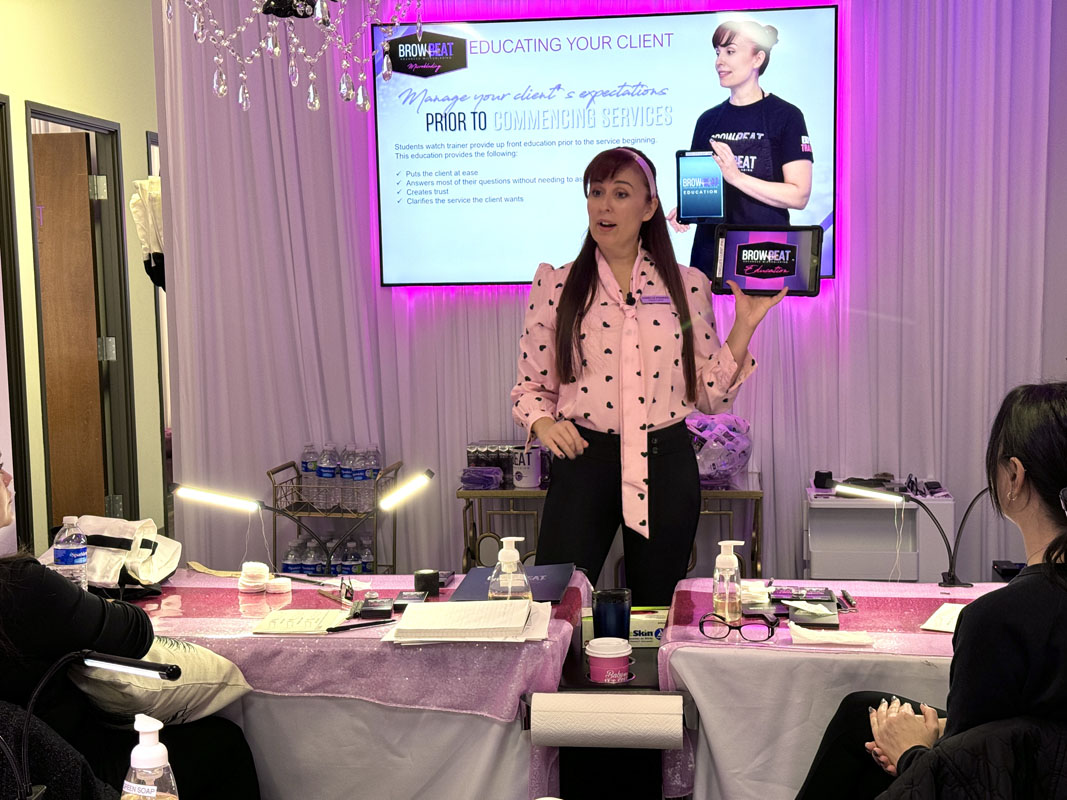
5. Understanding Continuing Education
Finally, certification requirements don’t end after your first course. To remain competitive, artists often pursue continuing education. Texas doesn’t mandate endless courses, but the industry evolves quickly. BrowBeat emphasizes lifelong learning, helping students see certification as the beginning of their journey, not the end.
Certification vs Licensing: Clearing Up the Confusion
One of the biggest points of confusion for new artists is the difference between certification and licensing. Let’s make this clear:
- Certification: This is the recognition you receive after completing a professional course. It proves you’ve been trained in specific techniques and safety practices.
- Licensing: This is a legal requirement issued by the state of Texas. It allows you to operate as a professional tattoo artist specializing in brows.
You need both. Certification shows you’ve been trained; licensing makes it legal. Some academies give students the impression that a certificate alone is enough—but that’s misleading. BrowBeat Studio Dallas Microblading Certification and Training Academy ensures every graduate understands both sides of the process and helps with the transition from classroom to state license.

What Students Must Prepare Before Training
Understanding certification requirements is only part of the process. As a student, you must also prepare yourself before enrolling in a course. BrowBeat Studio Dallas Microblading Certification and Training Academy provides detailed guidance to ensure students are ready to succeed.
Health and Eligibility
Students must be at least 18 years old to enroll in certification courses. Texas also requires students to be free from any medical restrictions that would prevent them from safely practicing semi-permanent makeup. While you don’t need a medical background, you must be able to follow safety guidelines and work with attention to detail.
Mindset and Dedication
Certification courses are intensive. At BrowBeat, three full days are packed with theory, practice, and simulation. Students must be committed to focus, practice consistently, and absorb a large amount of information. Unlike quick weekend workshops at other academies, BrowBeat programs demand dedication—and deliver better results.
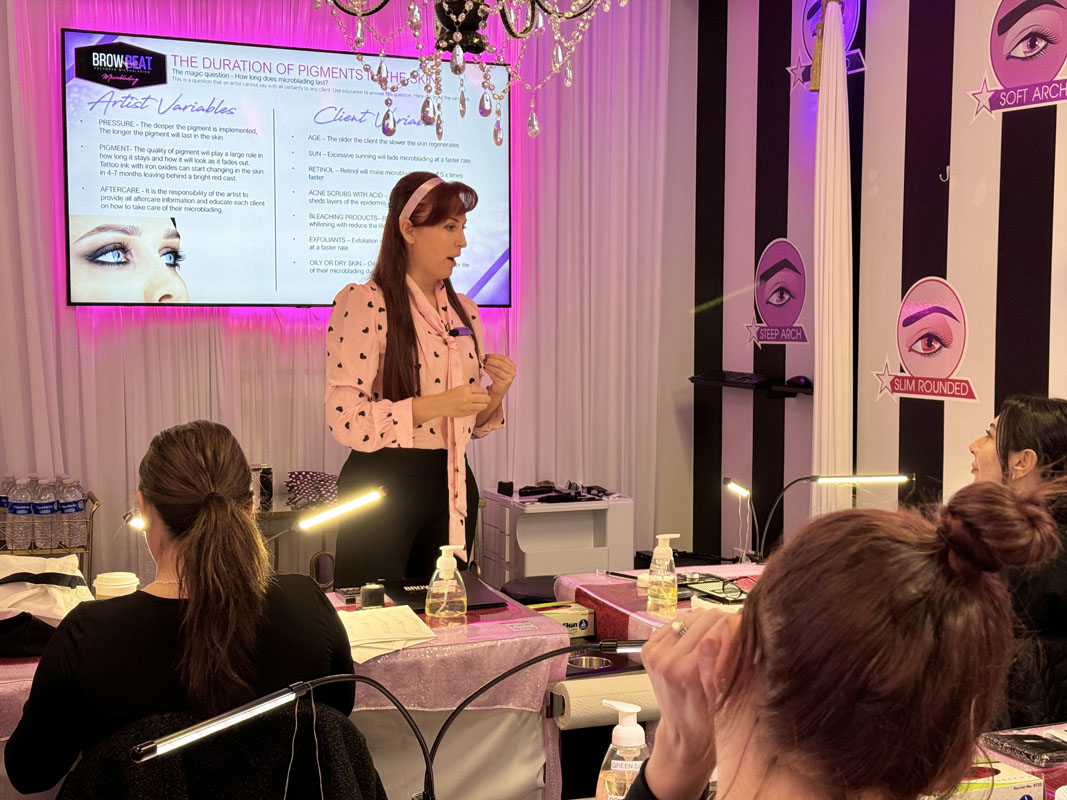
Financial Preparation
Another requirement is the financial investment. Certification is not free, but it is an investment in your career. Choosing a course that includes a complete kit, detailed instruction, and licensing guidance ensures that your money goes further. Unfortunately, some academies charge similar fees while offering less value, providing only partial kits or limited training.
Time Commitment
Students must set aside time not only for the three-day course but also for ongoing practice. Certification requirements don’t stop at the classroom door—students who practice consistently after graduation develop faster and build confidence sooner. BrowBeat encourages students to treat training as the foundation of a long-term career, not a one-time event.
The Risks of Ignoring Requirements (Competitor Gap)
Many new artists make the mistake of enrolling in the cheapest or shortest course available. These programs are often run by trainers with only one or two years of personal artistry experience. While they may have mastered their own technique, they often lack the teaching ability, industry knowledge, or regulatory understanding to prepare students properly.
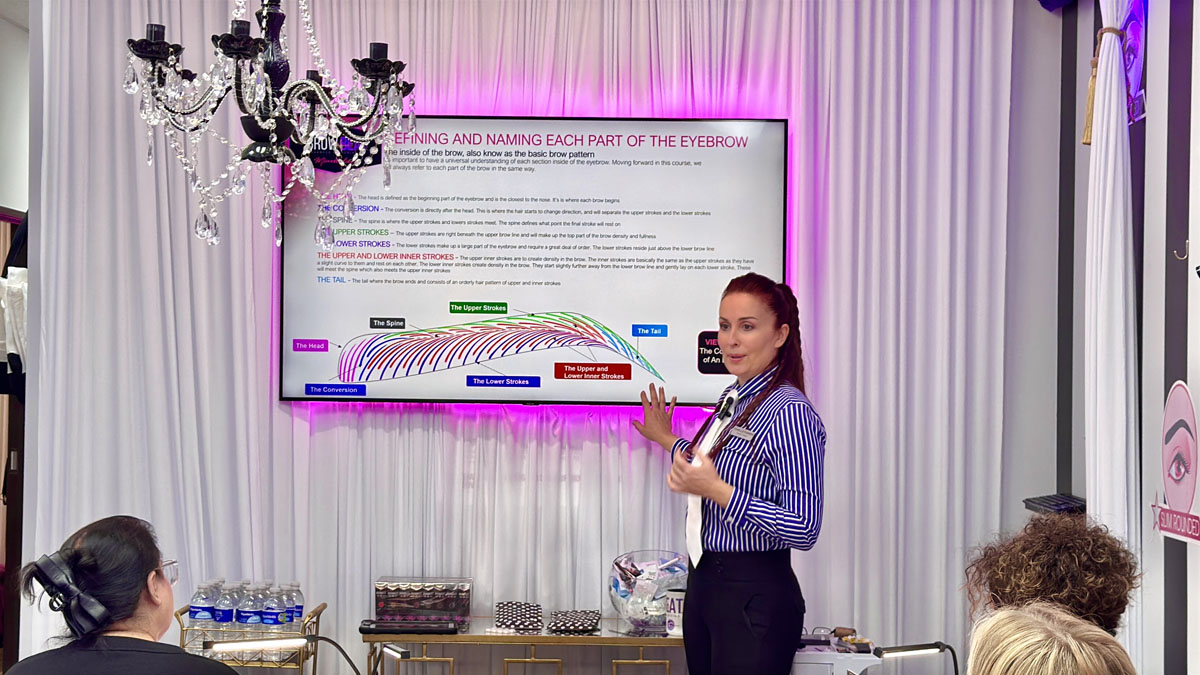
Here’s what happens when students ignore requirements and settle for weak training:
- Incomplete understanding: Students may learn how to perform strokes or shading but have no idea how to set up a licensed facility.
- Confusion about licensing: Some academies don’t even mention the need for a Texas tattoo license, leaving students shocked when they realize they still cannot practice legally.
- Weak kits: Many competitors hand out partial kits missing pigments, cartridges, or paperwork. Students must buy their own supplies, adding unexpected costs.
- Unrealistic promises: Fast-track courses promise students they’ll be client-ready in just a few hours of practice, which is not realistic or safe.
Choosing the wrong course wastes both time and money. Even worse, it risks your reputation. Clients who discover that an artist skipped requirements may walk away permanently. That’s why BrowBeat emphasizes the importance of choosing a program that respects the rules and sets you up for long-term success.
How BrowBeat Studio Dallas Microblading Certification and Training Academy Prepares Students
Unlike many quick-turn programs, BrowBeat Studio Dallas Microblading Certification and Training Academy takes requirements seriously. Every part of the course is designed to prepare students not just for certification, but for meeting state licensing standards and thriving in real-world practice.
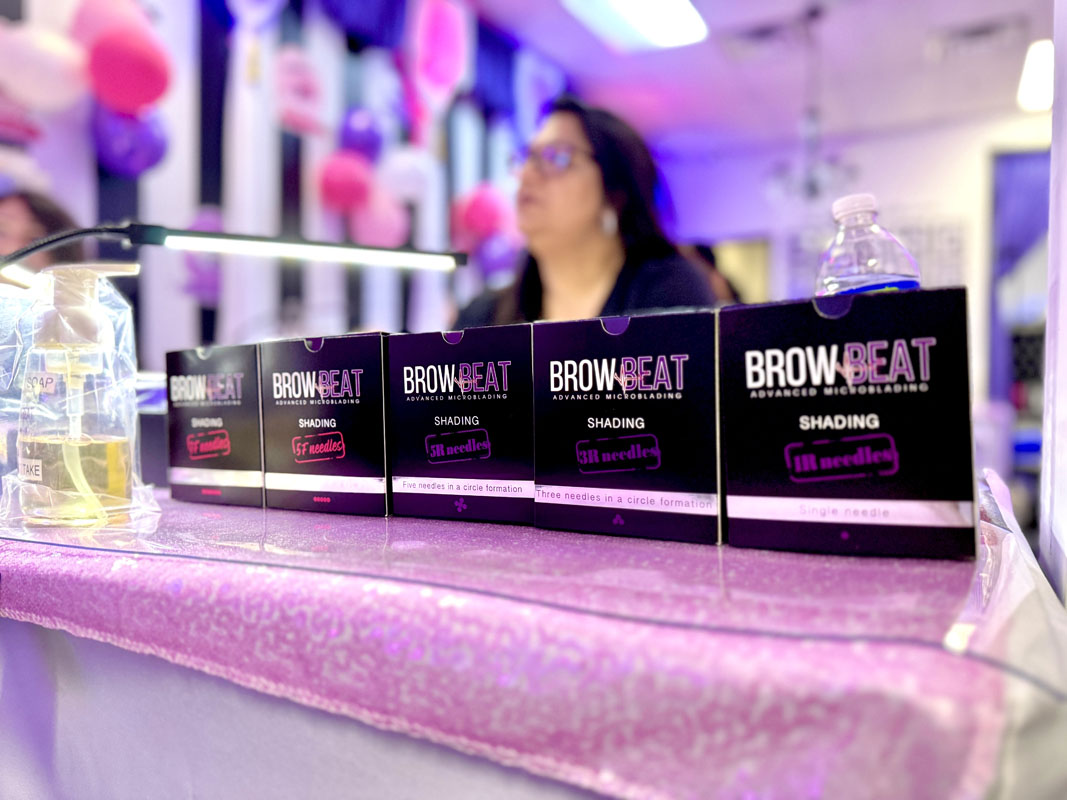
Comprehensive Training
The three-day structure covers stroke mastery, full treatment order, sanitation, brow mapping, PMU machine training, and combo techniques. Students leave with certificates in all three disciplines: microblading, ombré powder, and combo brows. This variety ensures graduates can adapt to different client requests immediately.
Health and Safety Emphasis
BrowBeat dedicates time each day to safety training, teaching students how to avoid cross-contamination, handle sharps, and create a hygienic workspace. This goes beyond what many academies offer and directly aligns with Texas certification requirements.
Complete Student Kit
Another way BrowBeat prepares students is by including a full kit with enrollment. Pigments, PMU machines, cartridges, brow wands, mapping tools, silicone practice skins, and paperwork are all included. Instead of scrambling to buy supplies later, students graduate with the tools they need to continue practicing.
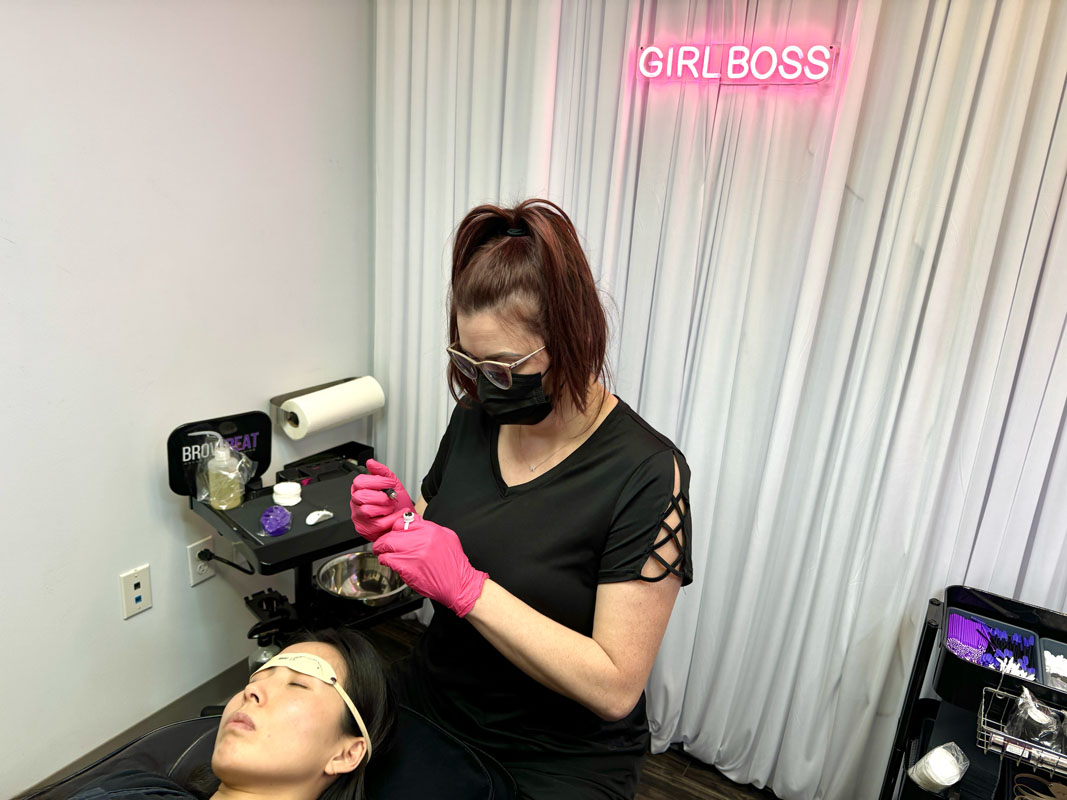
Guidance With Licensing
BrowBeat doesn’t stop at certification. The academy provides students with Texas tattoo license application forms and explains how to complete them. Trainers answer questions and walk students through the process, eliminating confusion and saving time.
Focus on Long-Term Success
Certification is only the beginning. BrowBeat encourages students to keep learning, practicing, and growing as professionals. With continued practice and dedication, students transform from beginners into skilled brow artists ready to build careers in Dallas and across Texas.
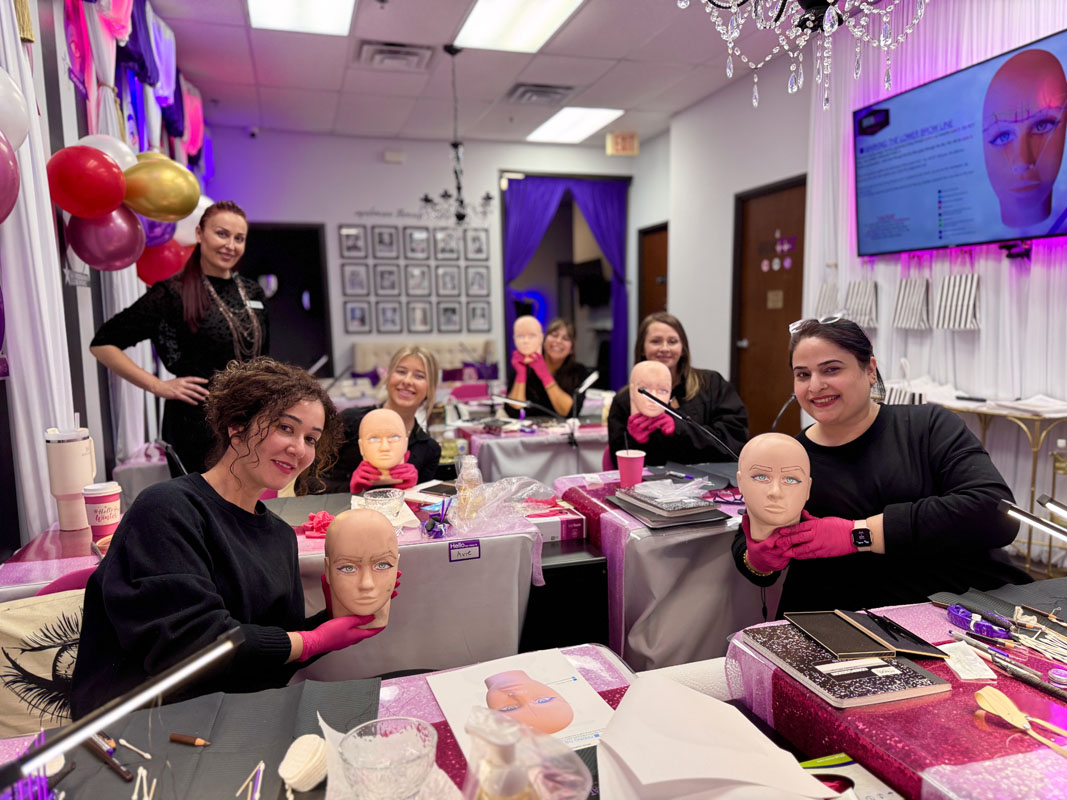
Frequently Asked Questions About Certification Requirements
Do I need a license to work after certification?
Yes. In Texas, certification shows you’ve completed training, but you also need a tattoo license to work legally. BrowBeat ensures students understand and complete this process.
How long does it take to meet requirements?
The certification course takes three days. Licensing paperwork usually takes several weeks to process after submission to the state. BrowBeat helps students complete the paperwork correctly the first time to avoid delays.
What happens if I take a course that doesn’t explain requirements?
Unfortunately, many students find themselves confused or unprepared after attending short or inexperienced programs. Without guidance, they cannot practice legally in Texas, even with a certificate in hand.
Is the kit part of the requirements?
The kit itself is not a state requirement, but it is an essential part of proper training. Having pigments, machines, cartridges, and practice tools included ensures students are prepared to practice safely and effectively.

Can I work immediately after certification?
You can begin practicing with your kit and simulation tools right away. However, to work on paying clients in Texas, you must wait until your tattoo license is approved by the state.
Conclusion: Meeting Certification Requirements the Right Way
Certification requirements for microblading and powder brows in Texas may seem complex, but with the right academy, the process becomes clear. Many programs run by trainers with just one or two years of experience fail to prepare students properly, skipping over licensing, facility rules, and health standards. Choosing an academy that respects and teaches these requirements is the difference between confusion and confidence.
BrowBeat Studio Dallas Microblading Certification and Training Academy ensures every student leaves with not only three professional certificates but also the knowledge and paperwork needed to meet Texas state requirements. From safety training to licensing guidance, BrowBeat takes the guesswork out of certification and sets students up for long-term success.
If you are ready to meet the requirements and begin your journey as a professional brow artist, enroll today. Schedule your enrollment at BrowBeat Studio Dallas Microblading Certification and Training Academy and take the first step toward a certified future.
